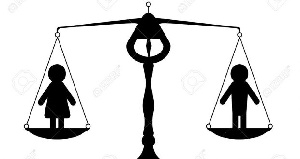 Women usually bear the brunt of all the forms of inequalities
Women usually bear the brunt of all the forms of inequalities
The few successes Ghana has chalked so far since attaining independence include the growth of a pluralistic media environment and a vibrant democracy. However, one major challenge that has consistently permeated our socio-economic and political fabric is the monster of gender inequality.
Statistics have shown that the deep-seated inequalities within segments of Ghana’s population, particularly between male and female populations is relatively high in the Ghanaian society.
According to University of Ghana’s Economics Senior Lecturer, Dr. Eric Osei-Assibey, the gendered dimensions of inequality in the Ghanaian society cut across economic development, education, healthcare, and even political representation. And these inequalities are mostly fueled by cultural and social practices.
Studies have also shown that women bear the brunt of all the forms of inequalities. Pointedly, inequality creates an unhealthy situation where most women feel insignificant as they are often relegated to the periphery, while men continue to benefit from patriarchy. Though several attempts have been made towards bridging the gender gap, a lot needs to be done. Of particular focus would be public education and the internet which have arguably proven to be effective tools in reversing the trend and creating an enabling environment for both genders.
The United Nations recently made gender-equitable access to Information and Communications Technologies (ICTs) central to the Sustainable Development Goals (SDGs), which set the global development agenda till 2030.
The digital space, however, presents its own challenges since the same offline patriarchal and misogynistic tendencies are often translated online, thus denying women access to the opportunities that the internet offers for self-development, economic empowerment, civic and political participation.
According to a 2017 baseline report by the Media Foundation for West Africa (MFWA), a wide range of factors, including but not limited to, cyber bullying, harassment, cyberstalking, body shaming, rape threats and revenge pornography hinder women from being online.
Although Ghana has a policy on compulsory ICT education in schools and integration of ICT into teacher training, implementation of the same has been slow since there are no specific gender targets for women or girls’ digital skills and education, thus reducing effective participation of women in the digital space. MFWA, in its report also noted that though a few civil society organisations maintain websites that provide information and services related to reproductive health, more efforts are needed in this area.
The report further observed that less than 20% of women in Ghana have access to the internet.
As a way of tackling these challenges, MFWA proposed the following ;
Establish specific targets to close the ICT gender gap: The MFWA suggested that the National ICT for Accelerated Development Policy should be reviewed to include targets for improving women and girls’ access to the web and bridging the ICT gender gap. Additionally, the report calls for the annual collection of data on women’s internet access and use.
Make internet more affordable: The report recommends the abolition of the 20% import tax imposed on mobile phones in Ghana. This should be accompanied with reducing the corresponding taxes on airtime besides enhancing internet penetration, particularly in rural Ghana so as to increase both access and affordability. Also, the government of Ghana must adopt pricing models and/or tax incentives to subsidize rural internet access. Multimedia centres offering public internet access should be made available throughout Ghana.
Improve Digital skills interventions or women and girls: MFWA urges the government to consider incorporating ICT literacy into teacher training and school curricula, and besides, encourage women and girls to enter science, technology, engineering, mathematics (STEM) programme. In addition, adult ICT centres and programmes should also be established to support women’s economic empowerment.
Make relevant content and services for women available online: MFWA calls on the government to ensure inclusion of women in the design and programming of ICT hardware and software so products, services and content are relevant to women. Again, training and supporting women’s groups to create content and use the internet and social media tools to amplify women’s voices is key to addressing these challenges.
Ensure a safe online enrollment: Existing policies should be revised to address online violence against women and awareness campaigns should be mounted to publicize the legal processes available for seeking redress. The Ghana Police Service and the Domestic Violence and Victims Support Unit (DOVVSU) must be trained and equipped with technical, human and financial resources to fight all forms of digitally enabled violence against women.
Progressive implementation of these strategies shall go a long way in ensuring victory over gender inequalities. This is a fight we cannot afford to lose as a country!